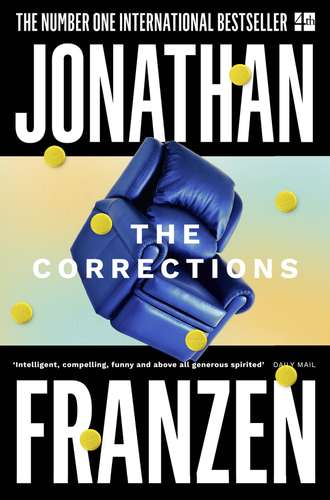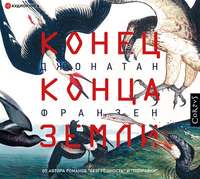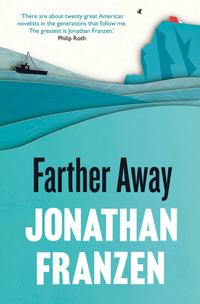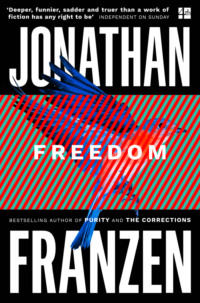
Полная версия
The Corrections
“Please come and have lunch. Please. Julia?”
The elevator door had opened at her touch.
“I’m saying it’s a tiny bit insulting to a person somehow.”
“But that’s not you. It’s not even based on you.”
“Oh, great. It’s somebody else’s breasts.”
“Jesus. Please. One second.” Chip turned back to his apartment door and opened it, and this time he was startled to find himself face to face with his father. Alfred’s big hands were shaking violently.
“Dad, hi, just another minute here.”
“Chip,” Alfred said, “ask her to stay! Tell her we want her to stay!”
Chip nodded and closed the door in the old man’s face; but in the few seconds his back had been turned the elevator had swallowed Julia. He punched the call button, to no avail, and then opened the fire door and ran down the spiral of the service stairwell. After a series of effulgent lectures celebrating the unfettered pursuit of pleasure as a strategy of subverting the bureaucracy of rationalism, BILL QUAINTENCE, an attractive young professor of Textual Artifacts, is seduced by his beautiful and adoring student MONA. Their wildly erotic affair has hardly begun, however, when they are discovered by Bill’s estranged wife, HILLAIRE. In a tense confrontation representing the clash of Therapeutic and Transgressive worldviews, Bill and Hillaire struggle for the soul of young Mona, who lies naked between them on tangled sheets. Hillaire succeeds in seducing Mona with her crypto-repressive rhetoric, and Mona publicly denounces Bill. Bill loses his job but soon discovers e-mail records proving that Hillaire has given Mona money to ruin his career. As Bill is driving to see his lawyer with a diskette containing the incriminating evidence, his car is run off the road into the raging D—— River, and the diskette floats free of the sunken car and is borne by ceaseless, indomitable currents into the raging, erotic/chaotic open sea, and the crash is ruled vehicular suicide, and in the film’s final scenes Hillaire is hired to replace Bill on the faculty and is seen lecturing on the evils of unfettered pleasure to a classroom in which is seated her diabolical lesbian lover Mona: This was the one-page précis that Chip had assembled with the aid of store-bought screenwriting manuals and had faxed, one winter morning, to a Manhattan-based film producer named Eden Procuro. Five minutes later he’d answered his phone to the cool, blank voice of a young woman saying, “Please hold for Eden Procuro,” followed by Eden Procuro herself crying, “I love it, love it, love it, love it, love it!” But now a year and a half had passed. Now the one-page précis had become a 124-page script called “The Academy Purple,” and now Julia Vrais, the chocolate-haired owner of that cool, blank personal-assistant’s voice, was running away from him, and as he raced downstairs to intercept her, planting his feet sideways to take the steps three and four at a time, grabbing the newel at each landing and reversing his trajectory with a jerk, all he could see or think of was a damning entry in his nearly photographic mental concordance of those 124 pages:
3: bee-stung lips, high round breasts, narrow hips and
3: over the cashmere sweater that snugly hugs her breasts
4: forward raptly, her perfect adolescent breasts eagerly
8: (eyeing her breasts)
9: (eyeing her breasts)
9: (his eyes drawn helplessly to her perfect breasts)
11: (eyeing her breasts)
12: (mentally fondling her perfect breasts)
13: (eyeing her breasts)
15: (eyeing and eyeing her perfect adolescent breasts)
23: (clinch, her perfect breasts surging against his
24: the repressive bra to unfetter her subversive breasts.)
28: to pinkly tongue one sweat-sheened breast.)
29: phallically jutting nipple of her sweat-drenched breast
29: I like your breasts.
30: absolutely adore your honeyed, heavy breasts.
33: (HILLAIRE’s breasts, like twin Gestapo bullets, can be
36: barbed glare as if to puncture and deflate her breasts
44: Arcadian breasts with stern puritanical terry cloth and
45: cowering, ashamed, the towel clutched to her breasts.)
76: her guileless breasts shrouded now in militaristic
83: I miss your body, I miss your perfect breasts, I
117: drowned headlights fading like two milk-white breasts
And there were probably even more! More than he could remember! And the only two readers who mattered now were women! It seemed to Chip that Julia was leaving him because “The Academy Purple” had too many breast references and a draggy opening, and that if he could correct these few obvious problems, both on Julia’s copy of the script and, more important, on the copy he’d specially laser-printed on 24-pound ivory bond paper for Eden Procuro, there might be hope not only for his finances but also for his chances of ever again unfettering and fondling Julia’s own guileless, milk-white breasts. Which by this point in the day, as by late morning of almost every day in recent months, was one of the last activities on earth in which he could still reasonably expect to take solace for his failures.
Exiting the stairwell into the lobby, he found the elevator waiting to torment its next rider. Through the open street door he saw a taxi extinguish its roof light and pull away. Zoroaster was mopping up inblown water from the lobby’s checkerboard marble. “Goodbye, Mister Chip!” he quipped, by no means for the first time, as Chip ran outside.
Big raindrops beating on the sidewalk raised a fresh, cold mist of pure humidity. Through the bead-curtain of water coming off the marquee, Chip saw Julia’s cab brake for a yellow light. Directly across the street, another cab had stopped to discharge a passenger, and it occurred to Chip that he could take this other cab and ask the driver to follow Julia. The idea was tempting; but there were difficulties.
One difficulty was that by chasing Julia he would arguably be committing the worst of the offenses for which the general counsel of D—— College, in a shrill, moralistic lawyer’s letter, had once upon a time threatened to countersue him or have him prosecuted. The alleged offenses had included fraud, breach of contract, kidnap, Title IX sexual harassment, serving liquor to a student under the legal drinking age, and possession and sale of a controlled substance; but it was the accusation of stalking—of making “obscene” and “threatening” and “abusive” telephone calls and trespassing with intent to violate a young woman’s privacy—that had really scared Chip and scared him still.
A more immediate difficulty was that he had four dollars in his wallet, less than ten dollars in his checking account, no credit to speak of on any of his major credit cards, and no prospect of further proofreading work until Monday afternoon. Considering that the last time he’d seen Julia, six days ago, she’d specifically complained that he “always” wanted to stay home and eat pasta and “always” be kissing her and having sex (she’d said that sometimes she almost felt like he used sex as a kind of medication, and that maybe the reason he didn’t just go ahead and self-medicate with crack or heroin instead was that sex was free and he was turning into such a cheapskate; she’d said that now that she was taking an actual prescription medication herself she sometimes felt like she was taking it for both of them and that this seemed doubly unfair, because she was the one who paid for the medication and because the medication made her slightly less interested in sex than she used to be; she’d said that, if it were up to Chip, they probably wouldn’t even go to movies anymore but would spend the whole weekend wallowing in bed with the shades down and then reheating pasta), he suspected that the minimum price of further conversation with her would be an overpriced lunch of mesquite-grilled autumn vegetables and a bottle of Sancerre for which he had no conceivable way of paying.
And so he stood and did nothing as the corner traffic light turned green and Julia’s cab drove out of sight. Rain was lashing the pavement in white, infected-looking drops. Across the street, a long-legged woman in tight jeans and excellent black boots had climbed out of the other cab.
That this woman was Chip’s little sister, Denise—i.e., was the only attractive young woman on the planet whom he was neither permitted nor inclined to feast his eyes on and imagine having sex with—seemed to him just the latest unfairness in a long morning of unfairnesses.
Denise was carrying a black umbrella, a cone of flowers, and a pastry box tied with twine. She picked her way through the pools and rapids on the pavement and joined Chip beneath the marquee.
“Listen,” Chip said with a nervous smile, not looking at her. “I need to ask you a big favor. I need you to hold the fort for me here while I find Eden and get my script back. There’s a major, quick set of corrections I have to make.”
As if he were a caddie or a servant, Denise handed him her umbrella and brushed water and grit from the ankles of her jeans. Denise had her mother’s dark hair and pale complexion and her father’s intimidating air of moral authority. She was the one who’d instructed Chip to invite his parents to stop and have lunch in New York today. She’d sounded like the World Bank dictating terms to a Latin debtor state, because, unfortunately, Chip owed her some money. He owed her whatever ten thousand and fifty-five hundred and four thousand and a thousand dollars added up to.
“See,” he explained, “Eden wants to read the script this afternoon sometime, and financially, obviously, it’s critical that we—”
“You can’t leave now,” Denise said.
“It’ll take me an hour,” Chip said. “An hour and a half at most.”
“Is Julia here?”
“No, she left. She said hello and left.”
“You broke up?”
“I don’t know. She’s gotten herself medicated and I don’t even trust—”
“Wait a minute. Wait a minute. Are you wanting to go to Eden’s, or chasing Julia?”
Chip touched the rivet in his left ear. “Ninety percent going to Eden’s.”
“Oh, Chip.”
“No, but listen,” he said, “she’s using the word ‘health’ like it has some kind of absolute timeless meaning.”
“This is Julia?”
“She takes pills for three months, the pills make her unbelievably obtuse, and the obtuseness then defines itself as mental health! It’s like blindness defining itself as vision. ‘Now that I’m blind, I can see there’s nothing to see.’”
Denise sighed and let her cone of flowers droop to the sidewalk. “What are you saying? You want to follow her and take away her medicine?”
“I’m saying the structure of the entire culture is flawed,” Chip said. “I’m saying the bureaucracy has arrogated the right to define certain states of mind as ‘diseased.’ A lack of desire to spend money becomes a symptom of disease that requires expensive medication. Which medication then destroys the libido, in other words destroys the appetite for the one pleasure in life that’s free, which means the person has to spend even more money on compensatory pleasures. The very definition of mental ‘health’ is the ability to participate in the consumer economy. When you buy into therapy, you’re buying into buying. And I’m saying that I personally am losing the battle with a commercialized, medicalized, totalitarian modernity right this instant.”
Denise closed one eye and opened the other very wide. Her open eye was like nearly black balsamic vinegar beading on white china. “If I grant that these are interesting issues,” she said, “will you stop talking about them and come upstairs with me?”
Chip shook his head. “There’s a poached salmon in the fridge. A crème fraîche with sorrel. A salad with green beans and hazelnuts. You’ll see the wine and the baguette and the butter. It’s good fresh butter from Vermont.”
“Has it occurred to you that Dad is sick?”
“An hour is all it’s going to take. Hour and a half at most.”
“I said has it occurred to you that Dad is sick?”
Chip had a vision of his father trembling and pleading in the doorway. To block it out, he tried to summon up an image of sex with Julia, with the azure-haired stranger, with Ruthie, with anyone, but all he could picture was a vengeful, Fury-like horde of disembodied breasts.
“The faster I get to Eden’s and make those corrections,” he said, “the sooner I’ll be back. If you really want to help me.”
An available cab was coming down the street. He made the mistake of looking at it, and Denise misunderstood him.
“I can’t give you any more money,” she said.
He recoiled as if she’d spat on him. “Jesus, Denise—”
“I’d like to but I can’t.”
“I wasn’t asking you for money!”
“Because where does it end?”
He turned on his heel and walked into the downpour and marched toward University Place, smiling with rage. He was ankle-deep in a boiling gray sidewalk-shaped lake. He was clutching Denise’s umbrella in his fist without opening it, and still it seemed unfair to him, it seemed not his fault, that he was getting drenched.
Until recently, and without ever giving the matter much thought, Chip had believed that it was possible to be successful in America without making lots of money. He’d always been a good student, and from an early age he’d proved unfit for any form of economic activity except buying things (this he could do), and so he’d chosen to pursue a life of the mind.
Since Alfred had once mildly but unforgettably remarked that he didn’t see the point of literary theory, and since Enid, in the florid biweekly letters by means of which she saved many dollars on long-distance dialing, had regularly begged Chip to abandon his pursuit of an “impractical” doctorate in the humanities (“I see your old science fair trophies,” she wrote, “and I think of what an able young man like you could be giving back to society as a medical doctor, but then, you see, Dad and I always hoped we’d raised children who thought of others, not just themselves”), Chip had had plenty of incentives to work hard and prove his parents wrong. By getting out of bed much earlier than his grad-school classmates, who slept off their Gauloise hangovers until noon or one o’clock, he’d piled up the prizes and fellowships and grants that were the coin of the academic realm.
For the first fifteen years of his adult life, his only experience with failure had come secondhand. His girlfriend in college and long after, Tori Timmelman, was a feminist theorist who’d become so enraged with the patriarchal system of accreditation and its phallometric yardsticks of achievement that she refused (or was unable) to finish her dissertation. Chip had grown up listening to his father pontificate on the topics of Men’s Work and Women’s Work and the importance of maintaining the distinction; in a spirit of correction, he stuck with Tori for nearly a decade. He did all of the laundry and most of the cleaning and cooking and cat care in the little apartment that he and Tori shared. He read secondary literature for Tori and helped her outline and reoutline the chapters of her thesis that she was too throttled by rage to write. Not until D—— College had offered him a five-year tenure-track appointment (while Tori, still minus a degree, took a two-year nonrenewable job at an agriculture school in Texas) did he fully exhaust his supply of male guilt and move on.
He arrived at D——, then, as an eligible and well-published thirty-three-year-old to whom the college’s provost, Jim Leviton, had all but guaranteed lifelong employment. Within a semester he was sleeping with the young historian Ruthie Hamilton and had teamed up at tennis with Leviton and brought Leviton the faculty doubles championship that had eluded him for twenty years.
D—— College, with an elite reputation and a middling endowment, depended for its survival on students whose parents could pay full tuition. To attract these students, the college had built a $30 million recreation center, three espresso bars, and a pair of hulking “residence halls” that were less like dorms than like vivid premonitions of the hotels in which the students would book rooms for themselves in their well-remunerated futures. There were herds of leather sofas and enough computers to ensure that no prospective matriculant or visiting parent could enter a room and not see at least one available keyboard, not even in the dining hall or field house.
Junior faculty lived in semi-squalor. Chip was lucky to have a two-story unit in a damp cinderblock development on Tilton Ledge Lane, on the western edge of campus. His back patio overlooked a waterway known to college administrators as Kuyper’s Creek and to everybody else as Carparts Creek. On the far side of the creek was a marshy automotive boneyard belonging to the Connecticut State Department of Corrections. The college had been suing in state and federal courts for twenty years to preserve this wetland from the “ecodisaster” of drainage and development as a medium-security prison.
Every month or two, for as long as things were good with Ruthie, Chip invited colleagues and neighbors and the occasional precocious student to dinner at Tilton Ledge and surprised them with langoustines, or a rack of lamb, or venison with juniper berries, and retro joke desserts like chocolate fondue. Sometimes late at night, presiding over a table on which empty Californian bottles were clustered like Manhattan high-rises, Chip felt safe enough to laugh at himself, open up a little, and tell embarrassing stories about his midwestern childhood. Like how his father not only had worked long hours at the Midland Pacific Railroad and read aloud to his children and done the yard work and home maintenance and processed a nightly briefcase full of executive paper but had also found time to operate a serious metallurgical laboratory in the family basement, staying up past midnight to subject strange alloys to electrical and chemical stresses. And how Chip at the age of thirteen had developed a crush on the buttery alkali metals that his father kept immersed in kerosene, on the blushing crystalline cobalt, the buxom heavy mercury, the ground-glass stopcocks and glacial acetic acid, and had put together his own junior lab in the shadow of his dad’s. How his new interest in science had delighted Alfred and Enid, and how, with their encouragement, he’d set his young heart on winning a trophy at the regional St. Jude science fair. How, at the St. Jude city library, he’d unearthed a plant-physiology paper both obscure enough and simple enough to be mistaken for the work of a brilliant eighth-grader. How he’d built a controlled plywood environment for growing oats and had photographed the young seedlings meticulously and then ignored them for weeks, and how, by the time he went to weigh the seedlings and determine the effects of gibberellic acid in concert with an unidentified chemical factor, the oats were dried-out blackish slime. How he’d gone ahead anyway and plotted the experiment’s “correct” results on graph paper, working backward to fabricate a list of seedling weights with some artful random scatter and then forward to make sure that the fictional data produced the “correct” results. And how, as a first-place winner at the science fair, he’d won a three-foot-tall silver-plated Winged Victory and the admiration of his father. And how, a year later, around the time his father was securing his first of two U.S. patents (despite his many grievances with Alfred, Chip was careful to impress on his dinner guests what a giant, in his own way, the old man was), Chip had pretended to study migratory bird populations in a park near some head shops and a bookstore and the house of a friend with foosball and a pool table. And how in a ravine at this park he’d uncovered a cache of downmarket porn over the weather-swollen pages of which, back home in the basement lab where, unlike his father, he never performed a real experiment or felt the faintest twinge of scientific curiosity, he’d endlessly dry-chafed the head of his erection without ever figuring out that this excruciating perpendicular stroke was actively suppressing orgasm (his dinner guests, many of them steeped in queer theory, took special delight in this detail), and how, as a reward for his mendacity and self-abuse and general laziness, he’d won a second Winged Victory.
In the haze of dinner-party smoke, as he entertained his sympathetic colleagues, Chip felt secure in the knowledge that his parents could not have been more wrong about who he was and what kind of career he was suited to pursue. For two and a half years, until the fiasco of Thanksgiving in St. Jude, he had no troubles at D—— College. But then Ruthie dumped him and a first-year female student rushed in, as it were, to fill the vacuum that Ruthie left behind.
Melissa Paquette was the most gifted student in the intro theory course, Consuming Narratives, that he taught in his third spring at D——. Melissa was a regal, theatrical person whom other students conspicuously avoided sitting close to, in part because they disliked her and in part because she always sat in the first row of desks, right in front of Chip. She was long-necked and broad-shouldered, not exactly beautiful, more like physically splendid. Her hair was very straight and had the cherry-wood color of new motor oil. She wore thrift-store clothes that tended not to flatter her—a man’s plaid polyester leisure suit, a paisley trapeze dress, gray Mr. Goodwrench coveralls with the name Randy embroidered on the left front pocket.
Melissa had no patience with people she considered fools. At the second meeting of Consuming Narratives, when an affable dreadlocked boy named Chad (every class at D—— had at least one affable dreadlocked boy in it) took a stab at summarizing the theories of Thorstein “Webern,” Melissa began to smirk at Chip complicitly. She rolled her eyes and mouthed the word “Veblen” and clutched her hair. Soon Chip was paying more attention to her distress than to Chad’s discourse.
“Chad, sorry,” she interrupted finally. “The name is Veblen?”
“Vebern. Veblern. That’s what I’m saying.”
“No, you were saying Webern. It’s Veblen.”
“Veblern. OK. Thank you very much, Melissa.”
Melissa tossed her hair and faced Chip again, her mission accomplished. She paid no attention to the dirty looks that came her way from Chad’s friends and sympathizers. But Chip drifted to a far corner of the classroom to dissociate himself from her, and he encouraged Chad to continue with his summary.
That evening, outside the student cinema in Hillard Wroth Hall, Melissa came pushing and squeezing through a crowd and told Chip that she was loving Walter Benjamin. She stood, he thought, too close to him. She stood too close to him at a reception for Marjorie Garber a few days later. She came galloping across the Lucent Technologies Lawn (formerly the South Lawn) to press into his hands one of the weekly short papers that Consuming Narratives required. She materialized beside him in a parking lot that a foot of snow had buried, and with her mittened hands and considerable wingspan she helped him dig out his car. She kicked a path clear with her fur-trimmed boots. She wouldn’t stop chipping at the underlayer of ice on his windshield until he took hold of her wrist and removed the scraper from her hand.
Chip had co-chaired the committee that drafted the college’s stringent new policy on faculty-student contacts. Nothing in the policy prevented a student from helping a professor clear snow off his car; and since he was also sure of his self-discipline, he had nothing to be afraid of. And yet, before long, he was ducking out of sight whenever he saw Melissa on campus. He didn’t want her to gallop over and stand too close to him. And when he caught himself wondering if the color of her hair was from a bottle, he made himself stop wondering. He never asked her if she was the one who’d left roses outside his office door on Valentine’s Day, or the chocolate statuette of Michael Jackson on Easter weekend.
In class he called on Melissa slightly less often than he called on other students; he lavished particular attention on her nemesis, Chad. He sensed, without looking, that Melissa was nodding in comprehension and solidarity when he unpacked a difficult passage of Marcuse or Baudrillard. She generally ignored her classmates, except to turn on them in sudden hot disagreement or cool correction; her classmates, for their part, yawned audibly when she raised her hand.











